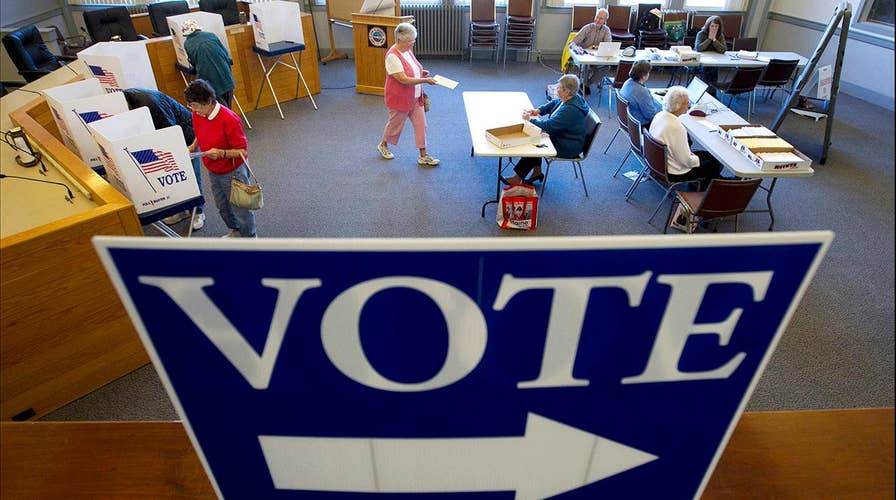Maine set to make electoral history
Maine to become the first in the nation to use ranked choice voting in a statewide primary. Molly Line reports.
Republican Rep. Bruce Poliquin has filed a lawsuit against the Maine secretary of state arguing the state’s new ranked-choice voting system has “undermined” constituents’ voting rights.
Poliquin, a 65-year-old two-term incumbent, is locked in a tight race with Democrat Jared Golden, the state House’s assistant majority leader. In the first round of the ranked-choice voting (RCV) process, Poliquin led with 46.3 percent of votes compared to Golden’s 45.6, according to the Bangor Daily News.
Under this system, voters rank candidates on the ballot in order of preference – instead of just choosing one person. If a candidate wins the majority of the vote, then they are declared the winner.
However, if no candidate receives a majority, then votes are counted in rounds with the lowest-ranked candidate eliminated per round until only two remain in a mathematical game of survival. For example, once a candidate is eliminated, the second-choice picks for voters who chose that eliminated candidate will then be counted as the remaining contenders move on to the next round. This process continues until only two candidates remain, with one receiving the majority of the vote – and declared the winner.
About 8 percent of voters chose two independents in the 2nd congressional district race: Tiffany Bond and Will Hoar. According to the Bangor Daily News, once those ballots are tabulated, Golden would emerge as the winner.
MAINE VOTERS WILL CAST BALLOTS TWO DIFFERENT TYPES OF WAY IN NOVEMBER ELECTION
Along with three Republican activists, Poliquin filed a lawsuit against Maine Secretary of State Matthew Dunlap Tuesday, alleging RCV violates the Constitution “which sets a plurality vote as the qualification for election to the U.S. House of Representatives.”

Rep. Bruce Poliquin, R-Maine, filed a federal lawsuit against Maine Secretary of State Matthew Dunlap in an attempt to stop a tabulation of ranked-choice ballots in his race against Democratic challenger Jared Golden. (AP Photo/Robert F. Bukaty)
Judge Lance Walker will hear arguments Wednesday morning in U.S. District Court in Bangor.
“Instead of respecting this important constitutional principle, the RCV Act directly contravenes it by denying individuals who obtained the highest number of votes after the first round of balloting – in this case, Bruce Poliquin – from being declared the winner of the general election,” the suit claims.
It makes several other arguments, too, including the “foundation of our ‘democratic process’ is the right of all qualified voters to cast their votes effectively.” It suggests that the ranked voting system “denies Plaintiffs the opportunity to cast their votes effectively.”
WHAT TO KNOW ABOUT MAINE'S RANKED-CHOICE VOTING SYSTEM
On Twitter, Poliquin said he is “standing up” for constituents who voted against using the ranked-choice system.
“We hold voting rights sacred, meaning one vote per person, which has always been the successful system used,” Poliquin said. “This RCV process no doubt gives additional preference to those who voted for a candidate who did not end up as one of the top two vote earners, thereby allowing them multiple votes. Whether that vote was for me or my opponent, it should not matter.”
“The process is flawed, creates tremendous confusion, and is proving to be a recipe for disaster, as Maine’s Second District predicted when they voted against it,” he continued.
“Our office is aware of pending litigation regarding the ranked choice voting tabulation process,” the Maine secretary of state's office said in a statement. “We are continuing to process ballots toward the final tabulation and will review any court orders with our legal advisors.”
Jon Breed, Golden’s campaign manager, responded to the lawsuit, saying, “Any attempt by Bruce Poliquin to change the rules after votes have already been cast is an affront to the law and to the people of Maine.”
“If Rep. Poliquin’s concerns were anything other than in self-interest, he should have filed this lawsuit before votes were cast, or when the Maine Republican Party challenged Maine’s election system last year,” Breed argued.
Supporters of the system say it has already cleared legal challenges. Several courts, including the 9th U.S. Circuit Court of Appeals in San Francisco, have upheld the constitutionality of ranked-choice voting, supporters said.
ABRAMS' CAMPAIGN PLANS ON JUDGE'S FAVORABLE RULING IN LAWSUIT, SAYS KEMP'S LEAD HAS NARROWED
“We're seeing these kinds of post-election sore loser lawsuits across the country,” said Rob Richie, of FairVote, an electoral reform group that pressed for Maine's adoption of the system.
Maine is the first state in the nation to use the system – though it wasn’t used for all races in the Nov. 6 election. It was used for the U.S. Senate race (with incumbent Angus King winning re-election) and the U.S. House races for the 1st and 2nd congressional districts. It was not used in the gubernatorial election, among others, because of concerns it runs afoul of Maine’s Constitution.
There was no controversy in Maine's other House race and Senate race. Democratic Rep. Chellie Pingree and independent King each won with a majority of the vote, making further tabulations unnecessary.
The Associated Press contributed to this report.





